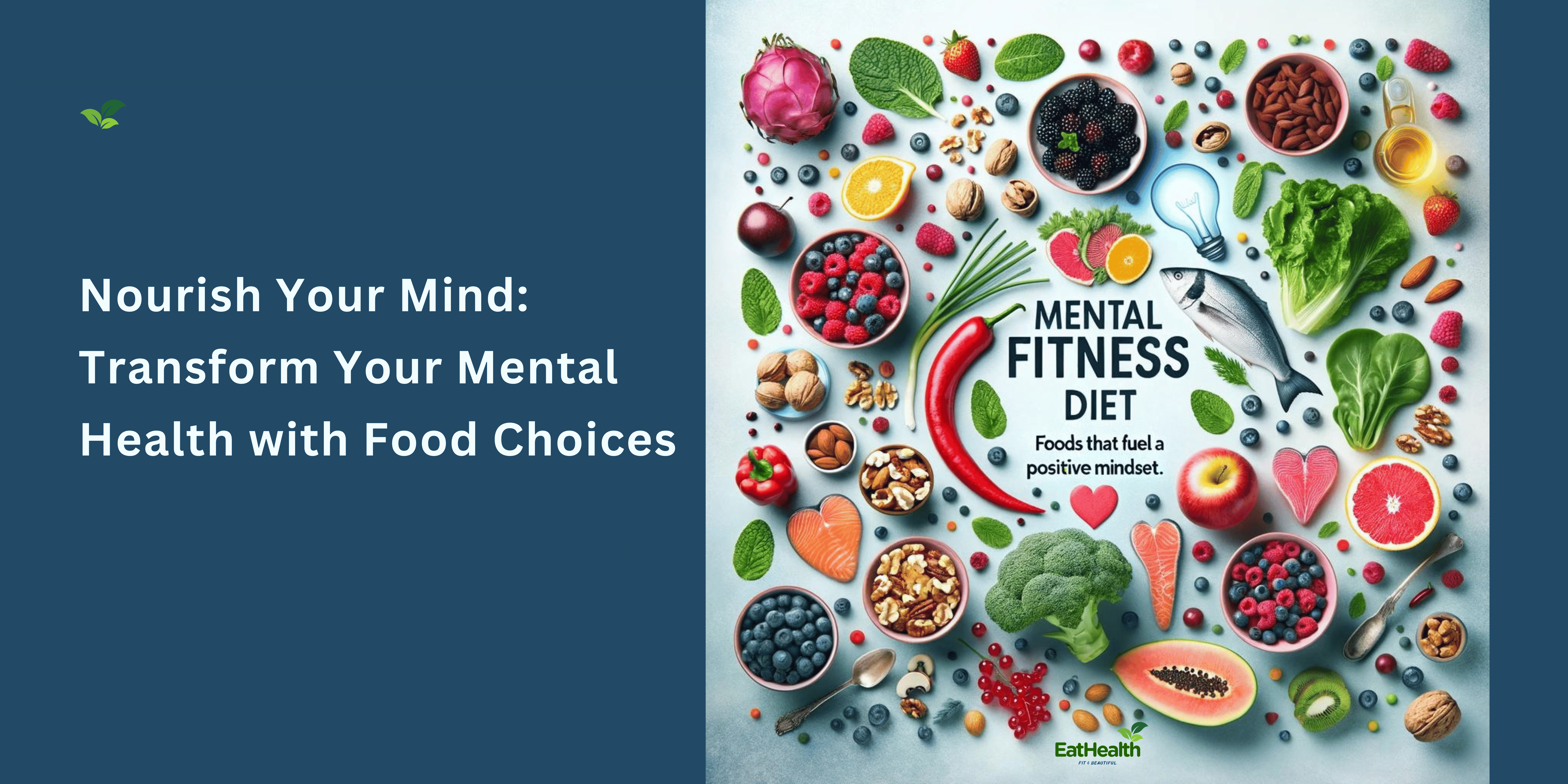Mental Fitness Diet: Foods that Fuel a Positive Mindset
Nourish Your Mind: Transform Your Mental Health with Food Choices
Mental Fitness Diet: Foods that Fuel a Positive Mindset
Just as physical fitness requires a balanced diet to thrive, so too does mental fitness. Our mental fitness diet plays a crucial role in shaping not only our physical health but also our mental well-being. The foods we consume can either fuel a positive mindset or contribute to feelings of lethargy, stress, and negativity. In this comprehensive guide, we will explore the concept of the mental fitness diet, identify foods that support a positive mindset, and provide practical tips for incorporating these foods into your daily routine.
Understanding the Mental Fitness Diet
The mental fitness diet refers to a way of eating that prioritizes foods known to support cognitive function, mood regulation, and overall mental well-being. Research has shown that certain nutrients can have a profound impact on brain health and function, influencing mood, cognition, and emotional resilience. By adopting a mental fitness diet, individuals can nourish their minds and bodies, enhancing their ability to cope with stress, maintain focus, and cultivate a positive outlook on life.
Key Nutrients for Mental Well-Being
Several key nutrients play a vital role in supporting mental health and cognitive function. These include:
- Omega-3 Fatty Acids: Found in fatty fish such as salmon, trout, and sardines, as well as walnuts, flaxseeds, and chia seeds, omega-3 fatty acids are essential for brain health. They have been shown to reduce inflammation, support neurotransmitter function, and improve mood.
- Antioxidants: Antioxidants, such as vitamins C and E, beta-carotene, and flavonoids, help protect the brain from oxidative stress and inflammation. Foods rich in antioxidants include berries, citrus fruits, leafy greens, nuts, and seeds.
- B Vitamins: B vitamins, including folate, vitamin B6, and vitamin B12, play a crucial role in neurotransmitter synthesis and mood regulation. Sources of B vitamins include leafy greens, legumes, whole grains, eggs, and lean meats.
- Protein: Protein provides the building blocks for neurotransmitters, the chemical messengers that regulate mood and behavior. Incorporate sources of lean protein such as poultry, fish, tofu, beans, and lentils into your meals to support mental health.
- Complex Carbohydrates: Complex carbohydrates, found in whole grains, fruits, and vegetables, provide a steady source of energy for the brain and help regulate blood sugar levels, preventing mood swings and fatigue.
- Magnesium: Magnesium plays a role in neurotransmitter function, stress regulation, and mood stability. Foods rich in magnesium include leafy greens, nuts, seeds, whole grains, and legumes.
Foods that Fuel a Positive Mindset
Now, let’s explore some specific foods that can fuel a positive mindset and support mental well-being:
- Fatty Fish: Incorporate fatty fish such as salmon, mackerel, and trout into your diet at least twice a week to boost omega-3 fatty acid intake and support brain health.
- Berries: Enjoy a variety of berries, such as blueberries, strawberries, and raspberries, which are rich in antioxidants and have been shown to improve cognitive function and mood.
- Leafy Greens: Load up on leafy greens like spinach, kale, and Swiss chard, which are packed with vitamins, minerals, and antioxidants that support brain health and cognitive function.
- Nuts and Seeds: Snack on nuts and seeds such as almonds, walnuts, pumpkin seeds, and chia seeds, which are rich in omega-3 fatty acids, protein, and magnesium.
- Whole Grains: Choose whole grains such as oats, brown rice, quinoa, and barley, which provide complex carbohydrates and fiber to support steady energy levels and mood stability.
- Lean Proteins: Include lean proteins like poultry, fish, tofu, and legumes in your meals to provide essential amino acids for neurotransmitter synthesis and mood regulation.
- Fruits and Vegetables: Aim to eat a colorful variety of fruits and vegetables, which provide a wide range of vitamins, minerals, and antioxidants to support overall health and well-being.
Practical Tips for Incorporating the Mental Fitness Diet
Here are some practical tips for incorporating the mental fitness diet into your daily routine:
- Plan Balanced Meals: Plan meals that include a variety of nutrient-rich foods from all food groups, including fruits, vegetables, whole grains, lean proteins, and healthy fats.
- Snack Smart: Keep healthy snacks such as nuts, seeds, fruits, and veggies on hand for when hunger strikes between meals. Avoid sugary snacks and processed foods, which can lead to energy crashes and mood swings.
- Stay Hydrated: Drink plenty of water throughout the day to stay hydrated and support optimal brain function. Limit consumption of sugary beverages and alcohol, which can have negative effects on mood and cognition.
- Mindful Eating: Practice mindful eating by paying attention to hunger and fullness cues, savoring the flavors and textures of your food, and eating without distractions to fully appreciate and enjoy your meals.
- Experiment with Recipes: Get creative in the kitchen by experimenting with new recipes that incorporate brain-boosting ingredients. Explore different cuisines and cooking techniques to keep meals interesting and flavorful.
- Listen to Your Body: Pay attention to how different foods make you feel and adjust your diet accordingly. Notice how certain foods impact your mood, energy levels, and overall well-being, and make choices that support your mental fitness goals. Just as we know Can The Mediterranean Diet Improve Physical Fitness?
Conclusion
In conclusion, the mental fitness diet offers a holistic approach to supporting mental health and well-being through nutrition. By prioritizing nutrient-rich foods that support brain health and mood regulation, individuals can cultivate a positive mindset, enhance cognitive function, and build resilience to stress. Whether it’s incorporating fatty fish for omega-3s, snacking on berries for antioxidants, or enjoying leafy greens for vitamins and minerals, every food choice can contribute to a healthier, happier mind. So, let’s nourish our bodies and minds with the power of the mental fitness diet for a brighter, more positive outlook on life.





